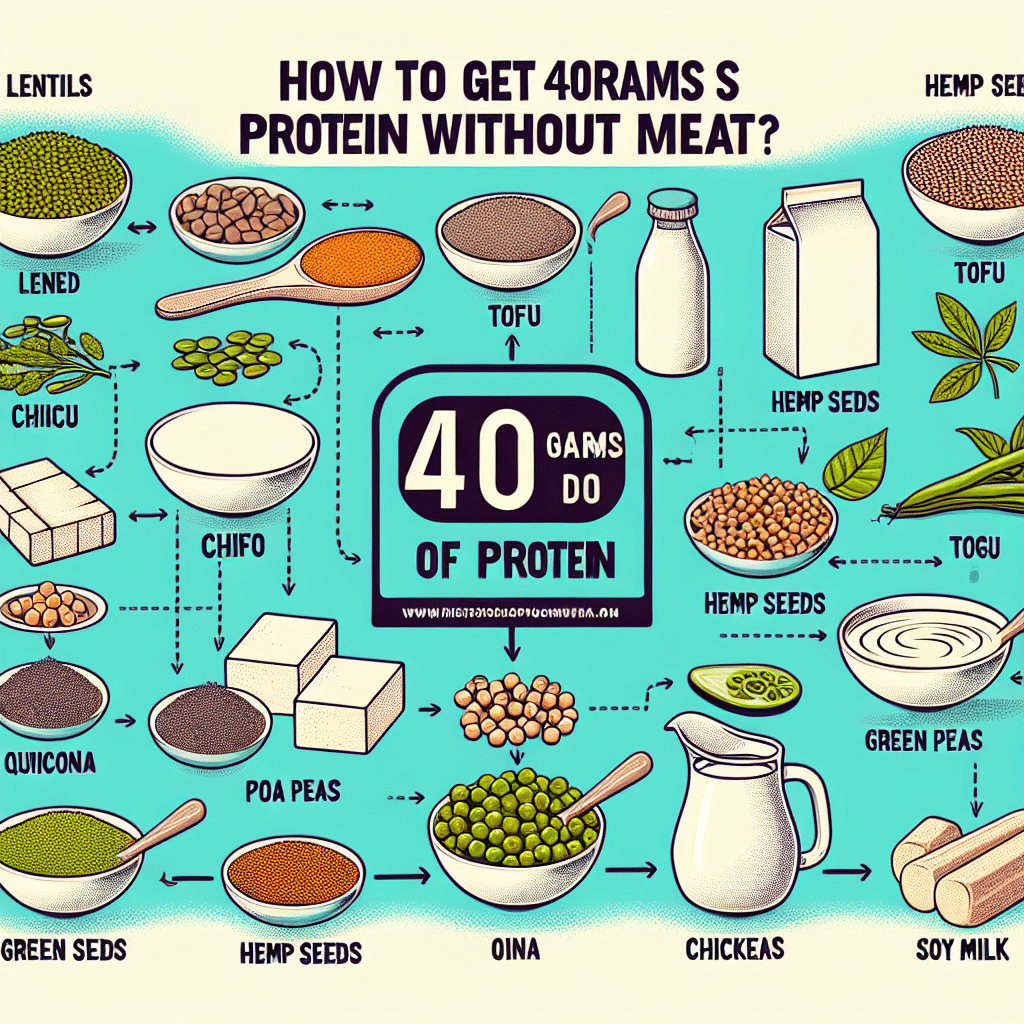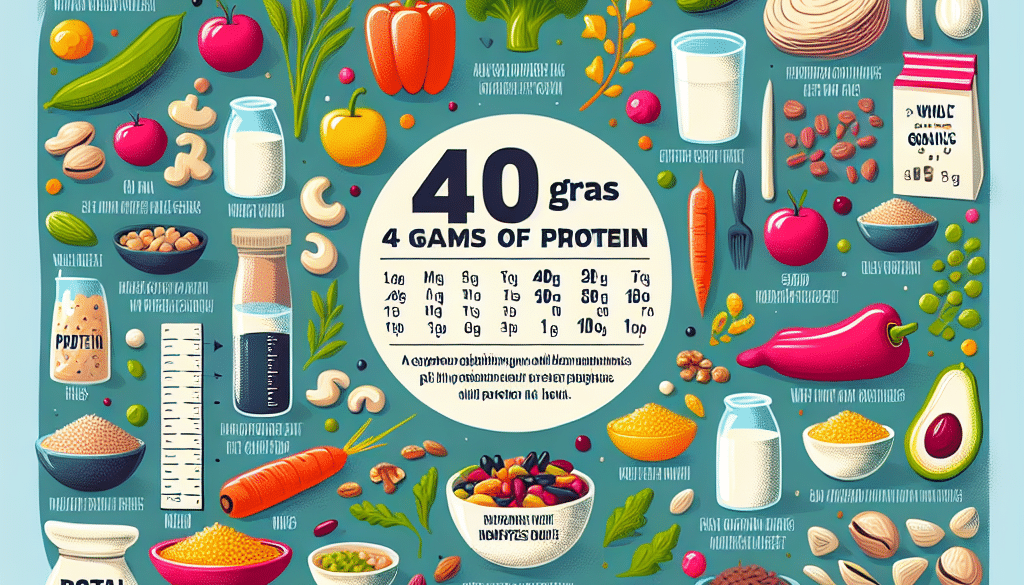How To Get 40grams Of Protein Without Meat?
-
Table of Contents
- 40 Grams of Protein Without Meat: A Comprehensive Guide
- Understanding Plant-Based Proteins
- Legumes: A Protein Powerhouse
- Whole Grains: More Than Just Fiber
- Nuts and Seeds: Nutrient-Dense Snacks
- Vegetables: The Unsung Heroes of Protein
- Plant-Based Protein Powders and Supplements
- Sample Meal Plan for 40 Grams of Protein Without Meat
- Conclusion: Achieving Protein Goals with Plants
- Discover ETprotein’s Plant-Based Protein Products
40 Grams of Protein Without Meat: A Comprehensive Guide

Protein is a crucial macronutrient that plays a vital role in building and repairing tissues, making enzymes and hormones, and providing the body with energy. While meat is often considered a primary source of protein, there are numerous reasons why individuals may choose to seek alternative sources. Whether it’s due to dietary preferences, ethical considerations, or health concerns, getting enough protein without meat is entirely possible. This article will explore how to achieve a daily intake of 40 grams of protein without relying on meat.
Understanding Plant-Based Proteins
Plant-based proteins come from various sources, including legumes, grains, nuts, seeds, and vegetables. Unlike animal proteins, plant-based proteins often contain fiber and complex carbohydrates, which can aid in digestion and provide sustained energy. Additionally, they are typically lower in saturated fats and free from cholesterol, making them heart-healthy options.
Legumes: A Protein Powerhouse
- Lentils: With about 18 grams of protein per cooked cup, lentils are an excellent meat alternative.
- Chickpeas: Offering around 15 grams of protein per cooked cup, chickpeas are versatile and can be used in a variety of dishes.
- Black beans: These beans provide about 15 grams of protein per cooked cup and are rich in antioxidants.
Legumes can be incorporated into meals in the form of soups, stews, salads, or even as a base for veggie burgers.
Whole Grains: More Than Just Fiber
- Quinoa: A complete protein with all nine essential amino acids, quinoa offers about 8 grams of protein per cooked cup.
- Oats: A staple breakfast food, oats contain around 6 grams of protein per half-cup serving.
- Whole wheat pasta: Substituting regular pasta with whole wheat versions can provide up to 7 grams of protein per cooked cup.
Whole grains can be enjoyed as part of a breakfast bowl, as a side dish, or as a main component in salads and casseroles.
Nuts and Seeds: Nutrient-Dense Snacks
- Almonds: With 6 grams of protein per ounce, almonds are a great snack or salad topping.
- Chia seeds: These tiny seeds pack about 5 grams of protein per ounce, along with omega-3 fatty acids.
- Pumpkin seeds: Also known as pepitas, they offer around 7 grams of protein per ounce.
Nuts and seeds can be eaten on their own, blended into smoothies, or used to enhance the texture and nutritional profile of baked goods.
Vegetables: The Unsung Heroes of Protein
- Spinach: This leafy green contains about 5 grams of protein per cooked cup.
- Broccoli: Known for its health benefits, broccoli provides approximately 4 grams of protein per cooked cup.
- Brussels sprouts: These cruciferous vegetables offer around 4 grams of protein per cooked cup.
Vegetables can be steamed, roasted, or sautéed and make excellent additions to any meal for an extra protein boost.
Plant-Based Protein Powders and Supplements
For those who struggle to meet their protein requirements through whole foods alone, plant-based protein powders and supplements can be an effective solution. Products such as pea protein, rice protein, and hemp protein can offer around 20 grams of protein per serving, making it easier to reach the 40-gram goal.
Sample Meal Plan for 40 Grams of Protein Without Meat
Here’s a simple meal plan that adds up to at least 40 grams of protein without including any meat:
- Breakfast: Oatmeal with almond butter and chia seeds (approx. 15 grams of protein)
- Lunch: Quinoa salad with chickpeas, spinach, and pumpkin seeds (approx. 20 grams of protein)
- Snack: A handful of almonds (approx. 6 grams of protein)
This meal plan not only meets the protein target but also provides a balance of other essential nutrients.
Conclusion: Achieving Protein Goals with Plants
Getting 40 grams of protein without meat is not only feasible but can also be delicious and nutritious. By incorporating a variety of plant-based proteins into your diet, you can enjoy the health benefits they offer while meeting your daily protein needs. Remember to vary your sources to ensure you’re getting a complete amino acid profile and all the essential nutrients your body requires.
Discover ETprotein’s Plant-Based Protein Products
If you’re looking for high-quality plant-based protein options, ETprotein offers a range of products that can help you meet your protein goals. Their selection includes organic rice protein, pea protein, and various seed proteins, all characterized by a neutral taste and non-GMO, allergen-free attributes. With L-(+)-Ergothioneine purity over 98%, ETprotein’s offerings cater to a diverse range of industries and dietary needs.
About ETprotein:
ETprotein, a reputable protein and L-(+)-Ergothioneine (EGT) Chinese factory manufacturer and supplier, is renowned for producing, stocking, exporting, and delivering the highest quality organic bulk vegan proteins and L-(+)-Ergothioneine. They include Organic rice protein, clear rice protein, pea protein, clear pea protein, watermelon seed protein, pumpkin seed protein, sunflower seed protein, mung bean protein, peanut protein, and L-(+)-Ergothioneine EGT Pharmaceutical grade, L-(+)-Ergothioneine EGT food grade, L-(+)-Ergothioneine EGT cosmetic grade, L-(+)-Ergothioneine EGT reference grade and L-(+)-Ergothioneine EGT standard. Their offerings, characterized by a neutral taste, non-GMO, allergen-free attributes, with L-(+)-Ergothioneine purity over 98%, 99%, cater to a diverse range of industries. They serve nutraceutical, pharmaceutical, cosmeceutical, veterinary, as well as food and beverage finished product distributors, traders, and manufacturers across Europe, USA, Canada, Australia, Thailand, Japan, Korea, Brazil, and Chile, among others.
ETprotein specialization includes exporting and delivering tailor-made protein powder and finished nutritional supplements. Their extensive product range covers sectors like Food and Beverage, Sports Nutrition, Weight Management, Dietary Supplements, Health and Wellness Products, and Infant Formula, ensuring comprehensive solutions to meet all your protein needs.
As a trusted company by leading global food and beverage brands and Fortune 500 companies, ETprotein reinforces China’s reputation in the global arena. For more information or to sample their products, please contact them and email sales(at)ETprotein.com today.












